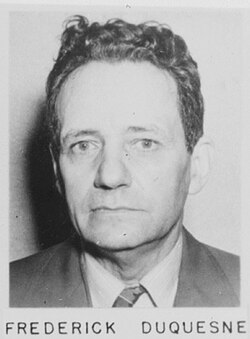Duquesne Spy Ring
 The Duquesne Spy Ring is the largest espionage case in the United States history that ended in convictions. A total of 33 members of a Nazi German espionage network, headed by Frederick "Fritz" Duquesne, were convicted after a lengthy investigation by the Federal Bureau of Investigation (FBI). Of those indicted, 19 pleaded guilty. The remaining 14 were brought to jury trial in Federal District Court, Brooklyn, New York, on September 3, 1941; all were found guilty on December 13, 1941. On January 2, 1942, the group members were sentenced to serve a total of over 300 years in prison.
The Duquesne Spy Ring is the largest espionage case in the United States history that ended in convictions. A total of 33 members of a Nazi German espionage network, headed by Frederick "Fritz" Duquesne, were convicted after a lengthy investigation by the Federal Bureau of Investigation (FBI). Of those indicted, 19 pleaded guilty. The remaining 14 were brought to jury trial in Federal District Court, Brooklyn, New York, on September 3, 1941; all were found guilty on December 13, 1941. On January 2, 1942, the group members were sentenced to serve a total of over 300 years in prison.The agents who formed the Duquesne Ring were placed in key jobs in the United States to get information that could be used in the event of war and to carry out acts of sabotage: one opened a restaurant and used his position to get information from his customers; another worked on an airline so that he could report Allied ships that were crossing the Atlantic Ocean; others worked as delivery people as a cover for carrying secret messages.
William G. Sebold, who had been blackmailed into becoming a spy for Germany, became a double agent and helped the FBI gather evidence. For nearly two years, the FBI ran a shortwave radio station in New York for the ring. They learned what information Germany was sending its spies in the United States and controlled what was sent to Germany. Sebold's success as a counterespionage agent was demonstrated by the successful prosecution of the German agents.
One German spymaster later commented the ring's roundup delivered "the death blow" to their espionage efforts in the United States. FBI director J. Edgar Hoover called his concerted FBI swoop on Duquesne's ring the greatest spy roundup in U.S. history.
The 1945 film ''The House on 92nd Street'' was a thinly disguised version of the ''Duquesne Spy Ring'' saga of 1941. Provided by Wikipedia
